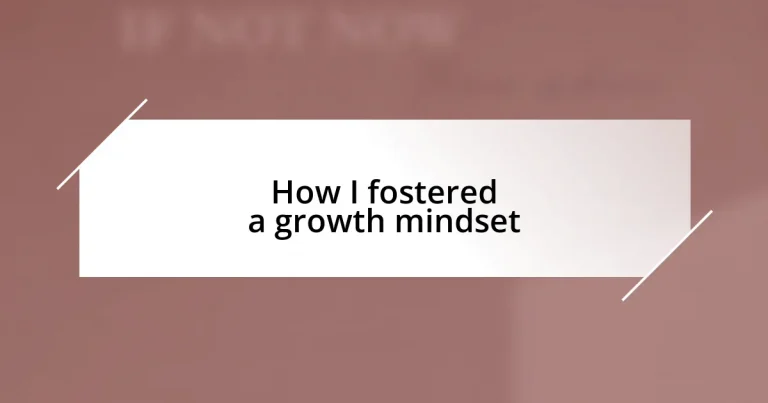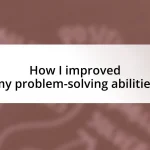Key takeaways:
- Embracing a growth mindset transforms challenges and failures into valuable learning experiences, promoting resilience and adaptability.
- Recognizing fixed mindset traits, such as avoiding challenges and fearing feedback, is essential for personal development and fostering a growth-oriented perspective.
- Cultivating self-awareness through reflection and setting achievable daily goals enhances motivation and fuels continuous learning.
- Actively seeking feedback and surrounding oneself with a supportive community enriches personal growth and strengthens commitment to a growth mindset.
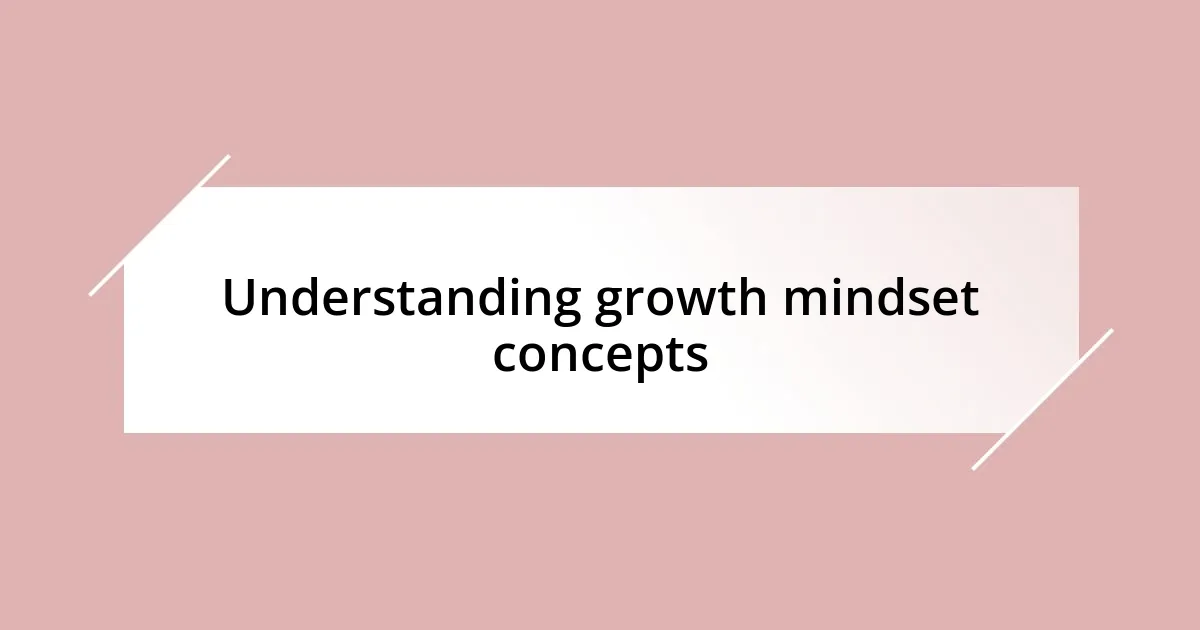
Understanding growth mindset concepts
When I first encountered the concept of a growth mindset, it was like a light bulb went off in my head. I realized that our abilities aren’t fixed; instead, they can be developed through dedication and hard work. Have you ever felt stuck in a particular skill? I used to think I was terrible at public speaking, but understanding that I could improve through practice was liberating.
One of the most fascinating aspects of a growth mindset is its focus on effort rather than inherent talent. I vividly remember a time when I struggled with a challenging project at work. Instead of feeling defeated, I adopted a learning perspective, which switched my mindset from “I can’t do this” to “What can I learn from this challenge?” It’s a small shift, but it opens up a world of possibilities.
Moreover, embracing a growth mindset allows us to see failures as stepping stones. I still recall the sting of a failed presentation I gave early in my career, but rather than letting it define me, I reflected on what went wrong and sought feedback. Have you ever experienced something similar? Looking back, those moments of discomfort taught me resilience and catalyzed my growth.
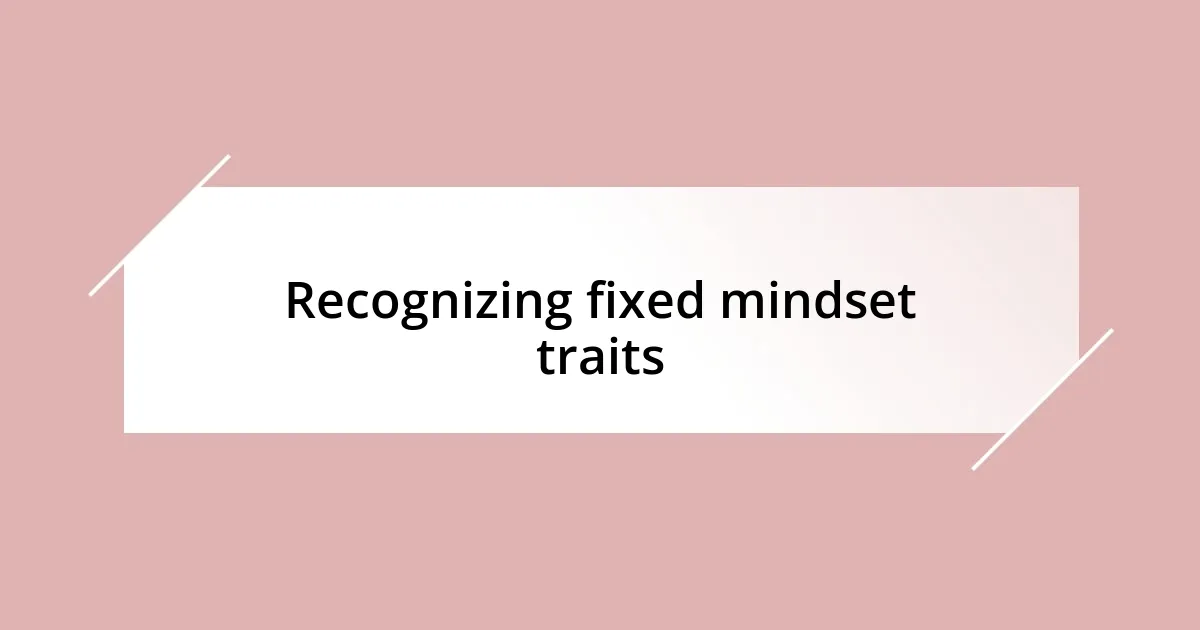
Recognizing fixed mindset traits
Recognizing fixed mindset traits can be eye-opening. When I began to reflect on my own tendencies, I noticed that I often avoided challenges. There were times I would shy away from projects that seemed too complex, fearing that I would fail or make mistakes. This instinct to retreat is a classic sign of a fixed mindset.
Another trait I’ve come to recognize is my reaction to feedback. In the past, I often took constructive criticism personally, viewing it as a reflection of my abilities rather than as valuable guidance for improvement. I remember one instance where a colleague pointed out areas for growth in my work, and my initial response was defensive. This reaction stunted my progress and illustrated how a fixed mindset can hinder development.
It’s also interesting to note how I used to perceive effort. In my earlier years, I believed that if I had to work hard at something, it meant I didn’t possess the talent for it. I distinctly recall a time when I struggled in a math class; instead of putting in the effort, I told myself I simply wasn’t “a math person.” Recognizing these fixed mindset traits was the first step toward embracing my capacity to learn and grow, and ultimately, it paved the way for a more fulfilling journey.
| Fixed Mindset Traits | Description |
|---|---|
| Avoiding Challenges | Shying away from complex projects for fear of failure. |
| Fear of Feedback | Taking constructive criticism personally and defensively. |
| Effort as a Weakness | Viewing hard work as a sign of lack of talent. |
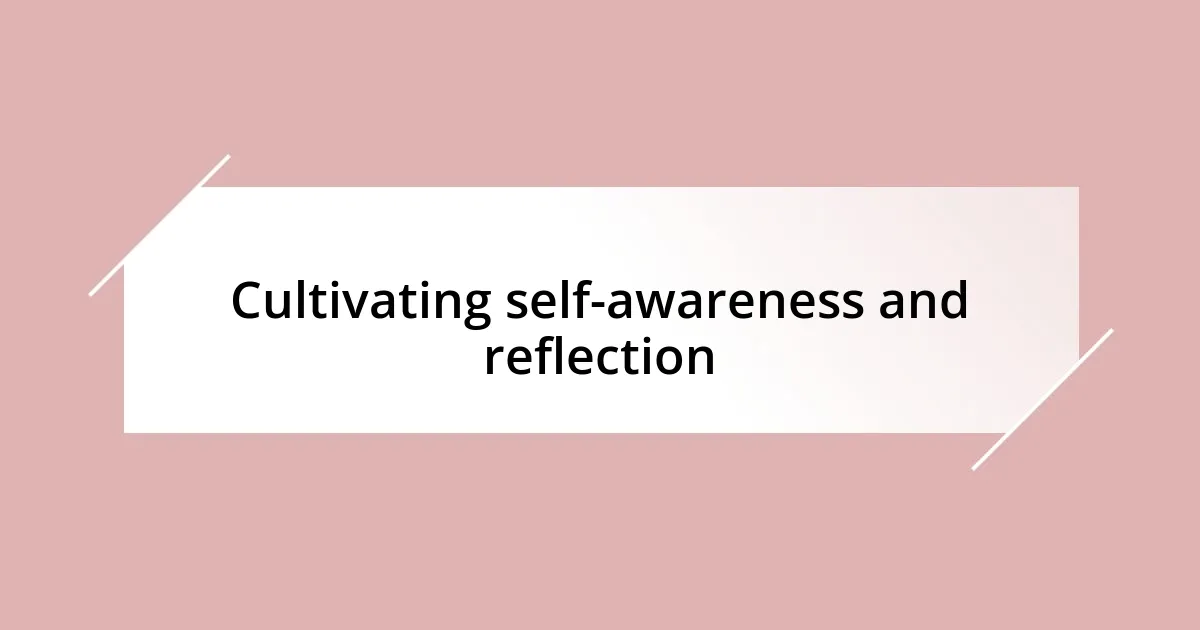
Cultivating self-awareness and reflection
Cultivating self-awareness and reflection has been pivotal in my journey toward a growth mindset. I remember sitting quietly one afternoon, journaling my thoughts. This simple act led me to recognize my emotional triggers, especially when faced with setbacks. I realized how often I sought external validation, and it struck me how detrimental that was to my self-growth. Acknowledging these moments became a cornerstone in my development.
- Self-awareness enables better decision-making, allowing me to choose responses that align with my growth goals.
- Regular reflection helps me identify patterns in my thought processes, shedding light on areas needing change.
- Emphasizing honesty in my reflections fosters authenticity, which ultimately strengthens my resilience.
Additionally, one of the most transformative practices I’ve adopted is asking myself powerful questions during moments of failure or stagnation. I distinctly recall a time when I was demoted at work. Instead of sinking into despair, I questioned, “What can I learn from this experience?” This shift in perspective opened new avenues for improvement and inspired me to seek mentorship, which undeniably accelerated my growth. I’ve come to appreciate that self-reflection is not merely about acknowledgment; it’s about harnessing insights that propel me forward.
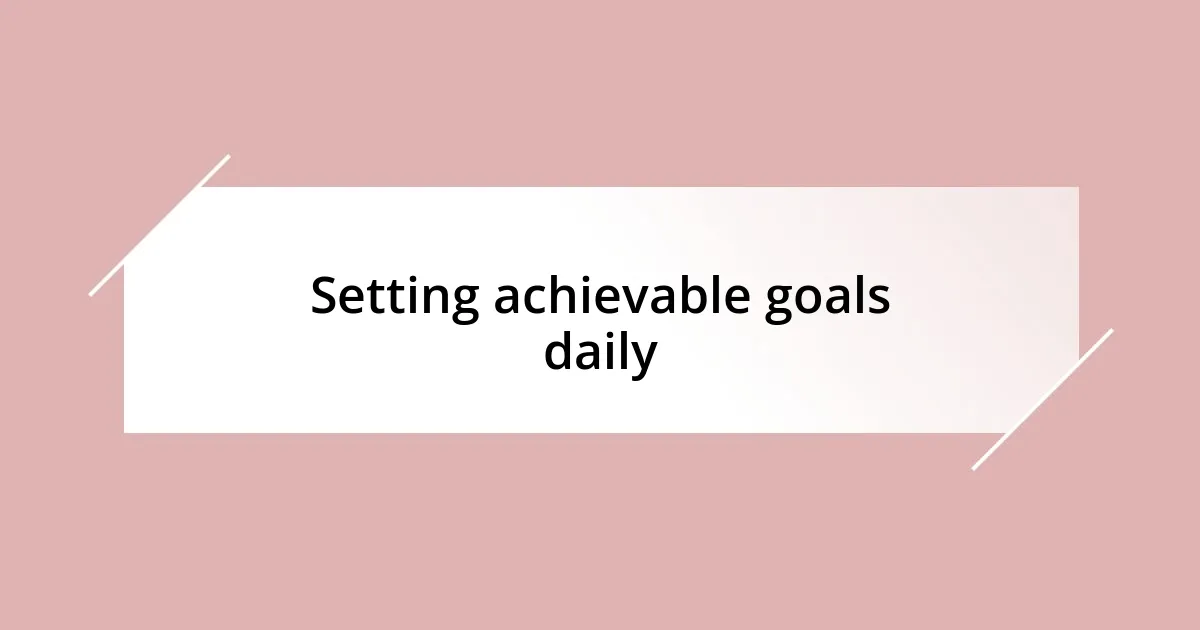
Setting achievable goals daily
Setting achievable goals daily has become a transformative practice in my life. I remember a time when I set my sights too high and ultimately felt overwhelmed. By breaking my aspirations into smaller, manageable tasks, I found that success in accomplishing even minor objectives boosted my confidence and motivation.
Every morning, I jot down three specific goals to achieve by the end of the day. For instance, one of my goals was simply to read one chapter of a book. This approach not only made me feel productive but also created a sense of accomplishment that fueled my progress. Have you ever experienced the satisfaction of ticking off tasks from your list? That feeling can turn a stressful day into a triumphant one.
Reflecting on my journey, I realized the importance of celebrating these small wins. Each goal achieved, no matter how trivial it may seem, serves as a stepping stone toward larger aspirations. I recall feeling a surge of positivity every time I crossed a goal off my list, reinforcing my belief that these daily targets play a crucial role in my growth mindset. This daily goal-setting ritual is more than just a habit; it’s a powerful tool for continuous learning and self-improvement.
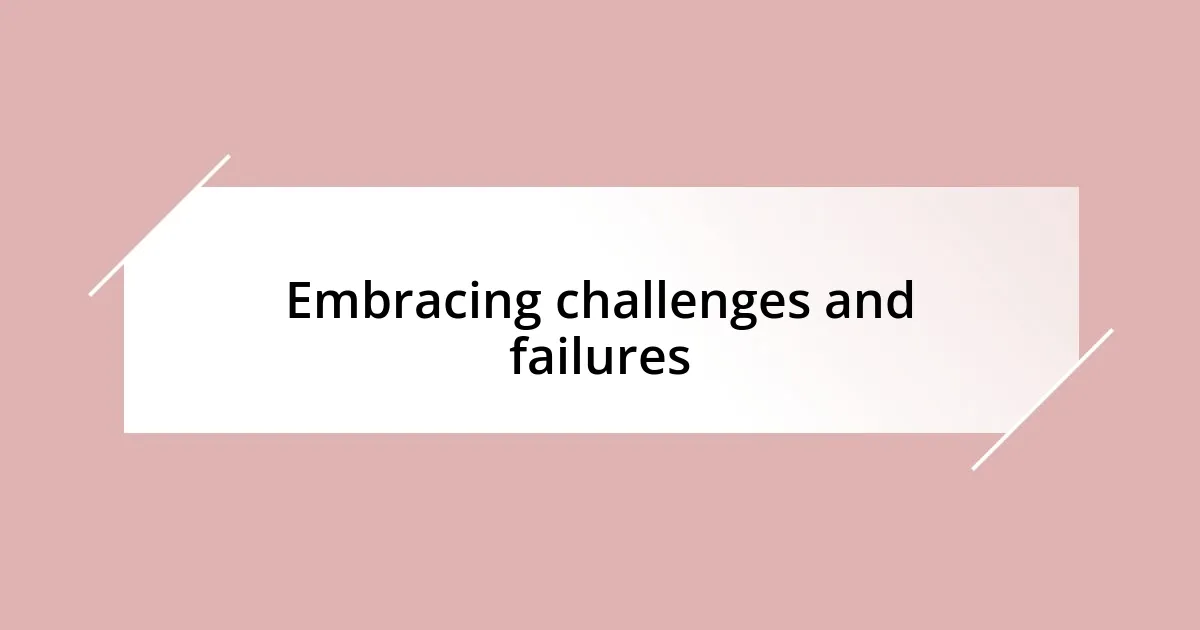
Embracing challenges and failures
Embracing challenges and failures has been a turning point for me. I vividly recall a time when I pursued a project that ended up falling flat. Instead of letting disappointment consume me, I took a moment to embrace the failure as a necessary part of my journey. What was the real lesson here? I understood that setbacks often reveal our strengths, but only if we’re open to learning from them.
It’s fascinating how every hurdle can become a stepping stone. For instance, during a crucial presentation, I stumbled over my words after misjudging my audience’s level of understanding. Rather than hiding from this mistake, I chose to confront it. I analyzed my approach afterward and sought feedback. Those moments of discomfort became valuable learning experiences, cementing my understanding that growth comes from grappling with our imperfections.
I often remind myself that every failure is an opportunity in disguise. A few years back, I started a side business that bombed spectacularly. At first, the shock felt paralyzing, but I soon realized that the insights I gained about market needs were priceless. Have you ever found wisdom hidden in your blunders? That’s the essence of embracing challenges: it transforms what could be a tragic ending into a plot twist worth exploring, ultimately shaping our narrative for the better.
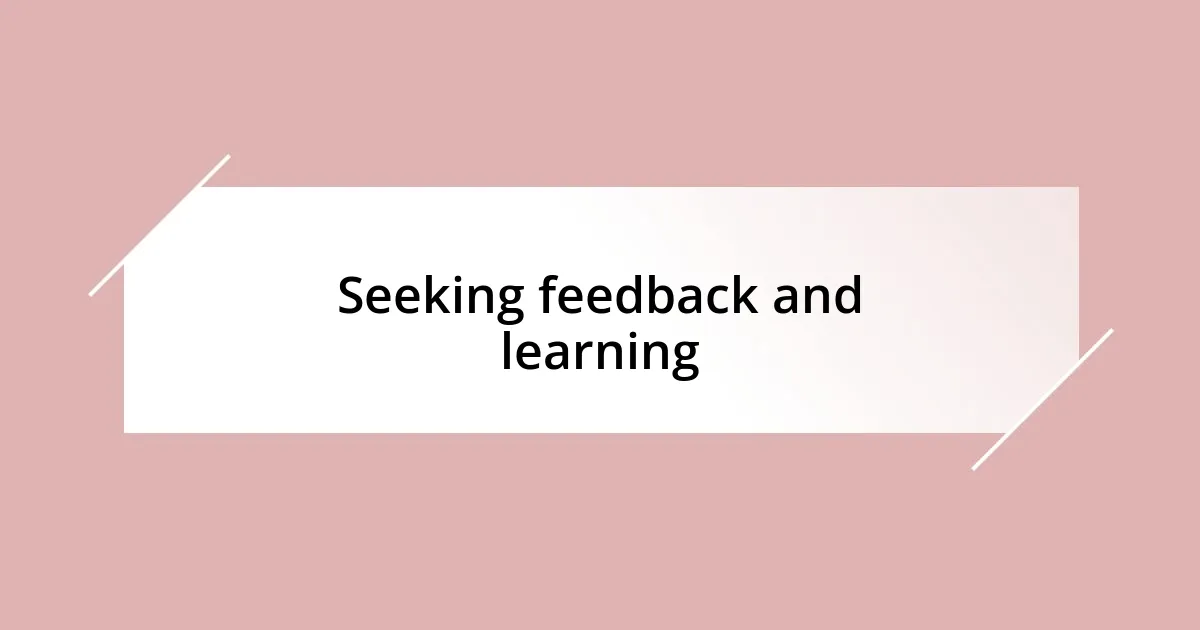
Seeking feedback and learning
Seeking feedback has been a game changer for me. I remember a time when I hesitated to ask my colleagues for their thoughts on a project I was passionate about. The fear of criticism felt daunting, but when I finally took that step, the insights I received opened my eyes to perspectives I hadn’t considered. Have you ever felt that rush of clarity when someone offers a fresh take on your work? It’s invigorating, isn’t it?
Learning from feedback isn’t always easy, though. I can still recall feeling defensive when my supervisor pointed out areas for improvement in my writing. Initially, my instinct was to justify my choices. Yet, after taking a deep breath, I revisited their suggestions and realized how much I could grow as a result. I began to approach feedback not as a threat, but as a bridge to better understanding my strengths and weaknesses. This shift transformed my perspective entirely.
Now, I actively seek feedback, knowing it fuels my journey of continuous learning. A few weeks ago, during a workshop, I shared a presentation without expecting much response. To my surprise, the constructive criticism I received helped me refine my approach for future sessions. Isn’t it fascinating how opening ourselves up to others can amplify our growth? Every piece of feedback becomes a stepping stone, guiding me toward new skills and deeper insights, and I wouldn’t want to navigate this journey any other way.
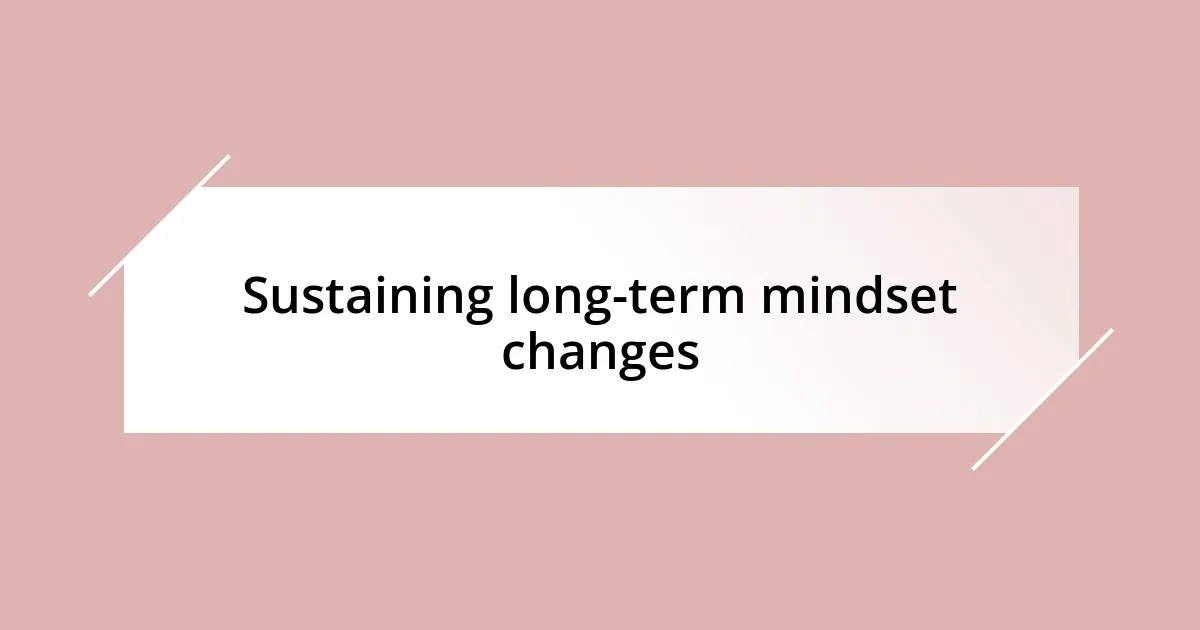
Sustaining long-term mindset changes
Sustaining a long-term growth mindset requires conscious effort. I’ve found that revisiting my motivations regularly is essential. For instance, every month, I set aside time to reflect on my progress and challenges. During this practice, I ask myself: “What have I learned that’s worth sharing?” This not only reinforces my commitment but also keeps me connected to my goals.
Consistency is another vital factor in maintaining these mindset changes. I recall integrating small daily habits, such as journaling my thoughts or seeking opportunities to learn something new. One morning, I decided to take a different route to work and discovered a new podcast that ignited my passion for personal development. Have you had moments like these? When you realize that exploration can lead to unexpected growth, it reinforces the idea that change doesn’t have to be drastic.
Finally, surrounding myself with a growth-focused community has proven invaluable. I intentionally seek out friends and mentors who challenge my thinking and inspire me. During a recent group discussion, one member shared their struggle with fear of failure, which ignited a deep, honest conversation. Reflecting on these collective experiences not only strengthens my commitment to the mindset but also reminds me that I’m not alone in this journey. This sense of belonging fuels my growth, making it a shared adventure worth pursuing.












